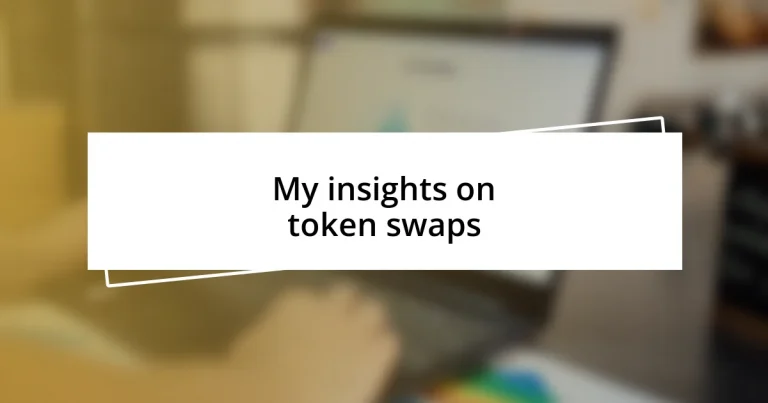Key takeaways:
- Token swaps are essential for portfolio diversification, liquidity management, and recognizing market trends, necessitating a solid understanding of these factors for successful trading.
- There are various types of token swaps—Atomic Swaps, Centralized Exchange Swaps, and Decentralized Exchange (DEX) Swaps—each offering different degrees of convenience, security, and control.
- Common challenges in token swaps include unpredictable price fluctuations, complex gas fees, and limited token availability on exchange platforms, which require thorough research and planning to navigate effectively.
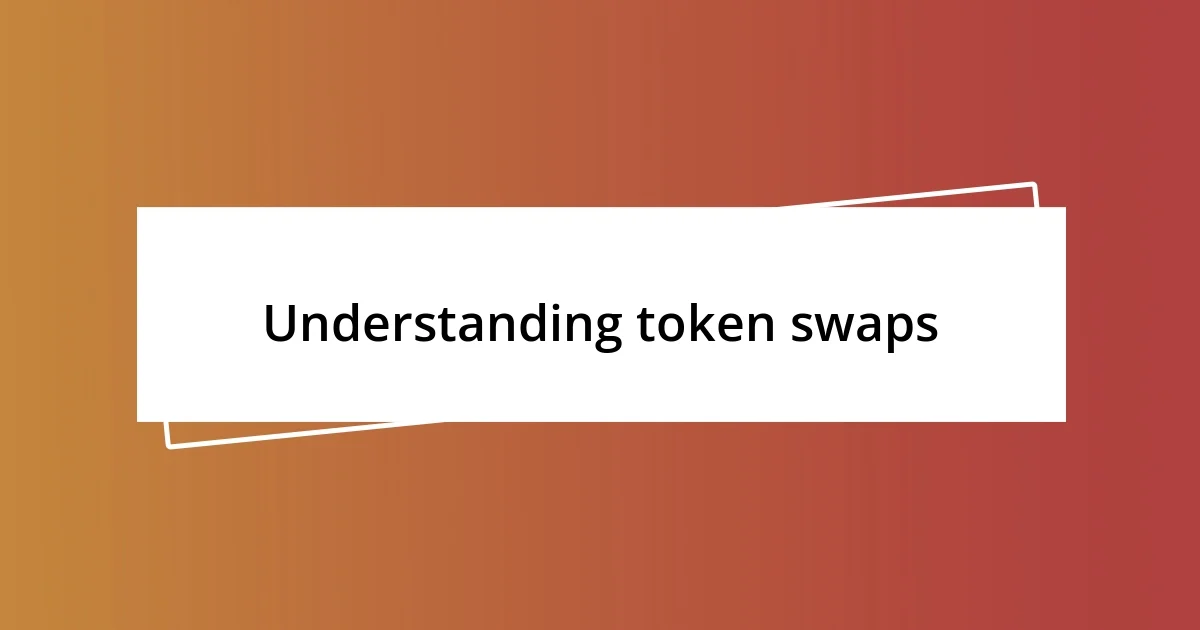
Understanding token swaps
Token swaps are a fundamental aspect of the cryptocurrency ecosystem, allowing users to exchange one type of token for another seamlessly. I remember the first time I dove into a token swap; I felt a mix of excitement and anxiety. Would I make the right choice? That moment opened my eyes to the importance of understanding market conditions and evaluating the tokens involved.
When engaging in a token swap, it’s crucial to grasp both the technology behind it and the reasons you’re making the exchange. I’ve often thought about how much easier it gets with practice; having a plan in place, with clear goals about what tokens you want to acquire, makes the process less daunting. Have you ever felt overwhelmed by the plethora of tokens available? I know I have, and that’s why educating yourself on the tokens and their utility can greatly enhance your confidence.
Each swap carries potential risks and rewards, shaped by various factors like liquidity, fees, and market sentiment. I can’t help but reflect on times I’ve seen others rush into swaps without proper research. It can lead to missed opportunities or unintended losses. My experience taught me that patience and a methodical approach are invaluable when navigating the world of token swaps.
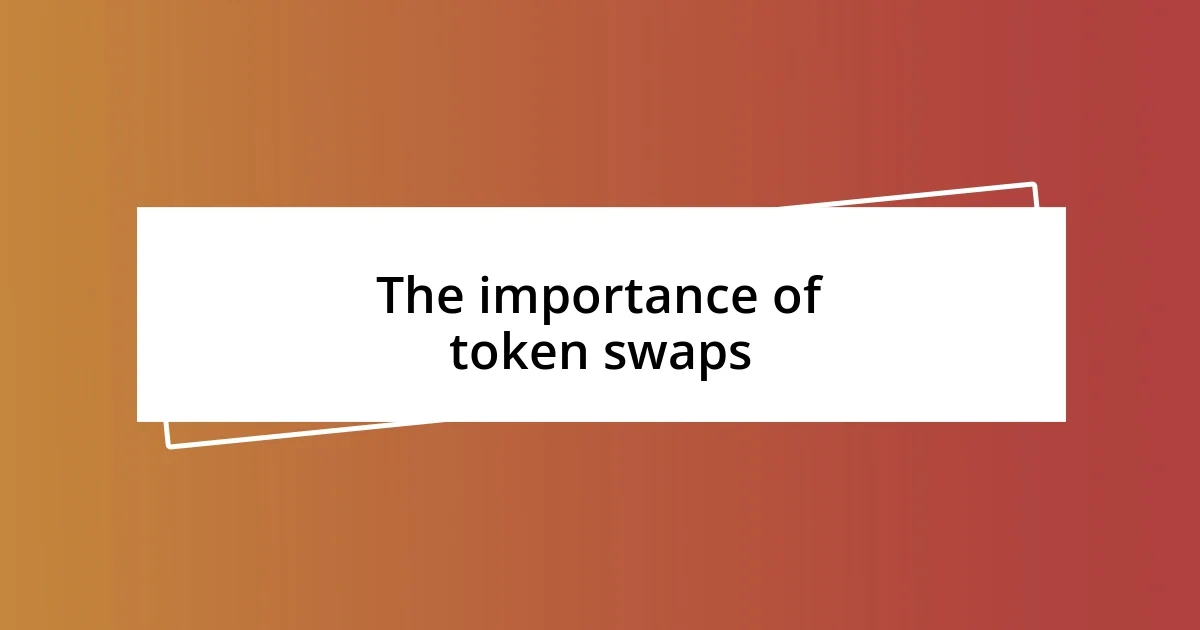
The importance of token swaps
Token swaps hold immense significance in the cryptocurrency landscape, as they enable users to diversify their portfolios and capitalize on different market opportunities. I vividly remember a time when I capitalized on a sudden price surge by swapping a lesser-known token for a more established one. It was exhilarating to see my portfolio grow due to that strategic decision, reinforcing my belief in the power of informed swaps.
Another vital aspect of token swaps is liquidity. Without adequate liquidity, executing a swap could become challenging, leading to unfavorable trading conditions. I recall one instance when I attempted to swap a rather obscure token. The liquidity was so thin that I ended up getting a far less favorable rate than expected. This experience made it clear to me that understanding liquidity dynamics is essential for achieving the best outcomes.
Additionally, token swaps can indicate broader market trends and sentiment. Observing which tokens are being swapped frequently can serve as a valuable market signal. Recently, I noticed a surge in swaps for a specific token associated with emerging technology. This prompted me to research further, leading to a significant investment opportunity. My experience taught me that by paying attention to swap trends, one can stay ahead of the curve in the fast-paced crypto world.
| Factor | Importance |
|---|---|
| Portfolio Diversification | Enables capitalizing on various market opportunities and reducing risk exposure. |
| Liquidity | Ensures that swaps can be executed efficiently and at favorable rates. |
| Market Trends | Indicates potential investment opportunities based on popular token swaps. |
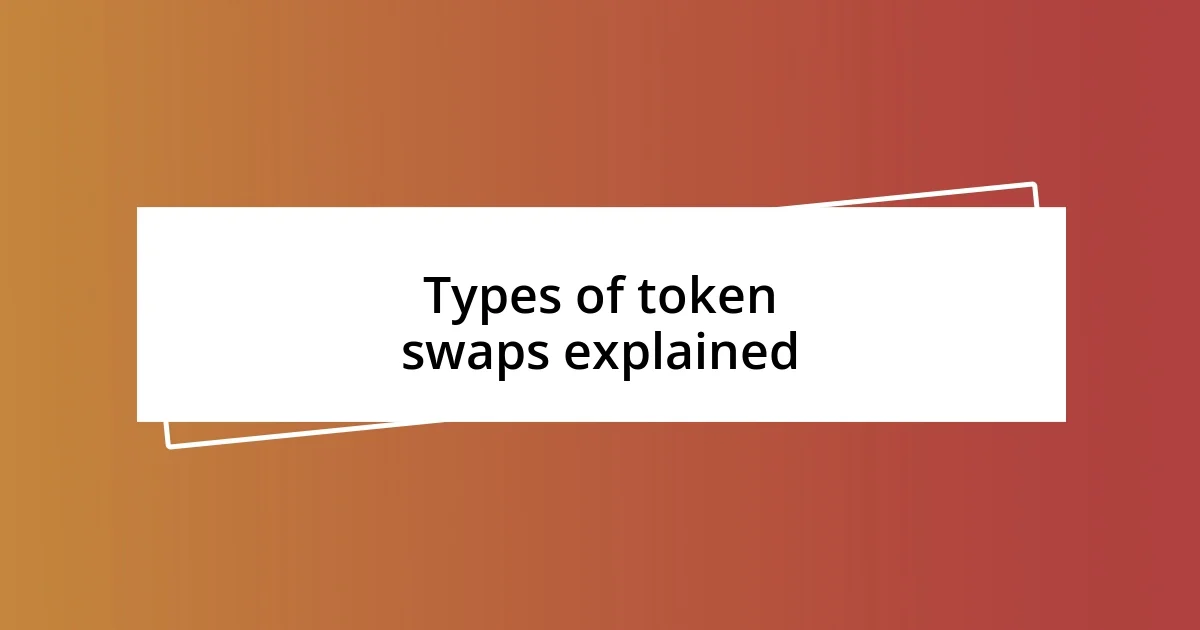
Types of token swaps explained
Token swaps come in various forms, each serving different purposes and user needs. When I first explored these swaps, I realized they weren’t just about exchanging tokens but understanding the context and conditions surrounding each type. Here are a few common types of token swaps:
-
Atomic Swaps: This decentralized method allows users to swap tokens directly without intermediaries, ensuring security but requiring compatible blockchain networks.
-
Centralized Exchange Swaps: These swaps occur on platforms like Binance or Coinbase, offering convenience but often with higher fees and reliance on third-party security.
-
Decentralized Exchange (DEX) Swaps: Utilizing smart contracts, DEX swaps empower users to maintain control over their assets while trading directly on the blockchain. I remember feeling a sense of liberation using a DEX for the first time.
I’ve witnessed the differences in experience with each type of swap firsthand. For instance, an atomic swap left me relieved when it executed flawlessly, while engaging in a DEX swap filled me with a sense of adventure and control. Reflecting on these swaps, I appreciate how each option, whether requiring trust in a central authority or relying solely on a contract, influences both strategy and sentiment in trading decisions.
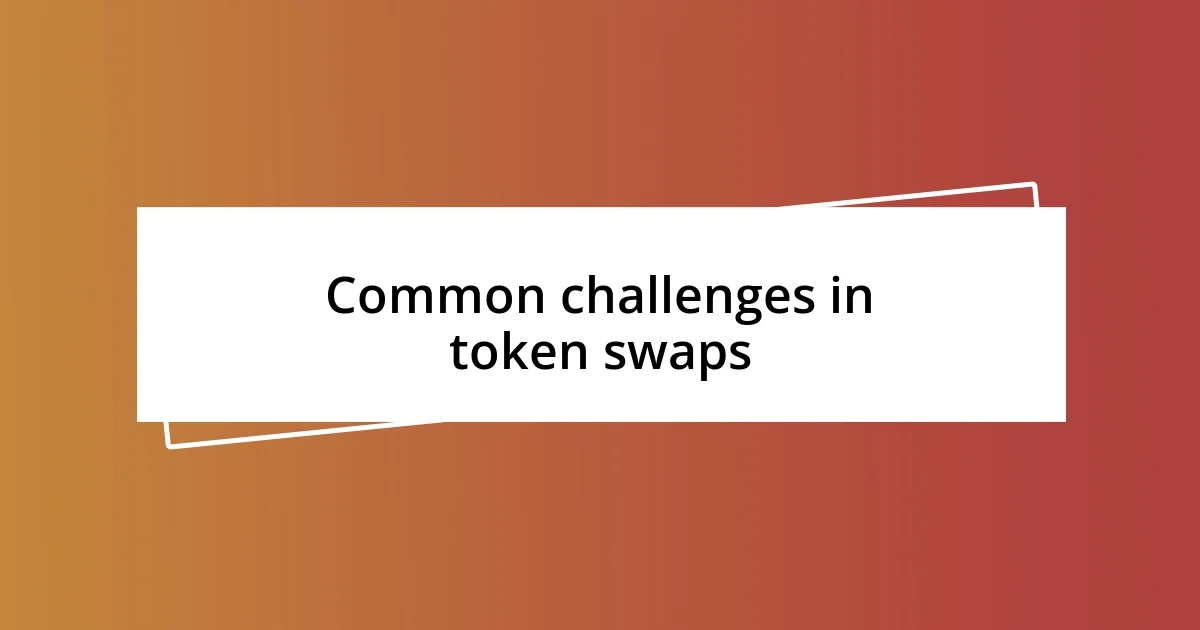
Common challenges in token swaps
Swapping tokens may seem straightforward, but I’ve faced some surprises along the way. One common challenge is the unpredictability of price fluctuations during the swap process. I vividly recall a moment when I initiated a token swap, only to watch the price I expected slip away right before my eyes. How frustrating is that? It highlighted the necessity of timing and staying aware of market conditions to get the most out of a swap.
Another issue that often arises is the complexity of understanding the gas fees involved. I remember being caught off guard by high transaction fees one time when swapping a token on a congested network. I thought I was making a smart move, but the fees nearly swallowed my potential profits. This taught me to always evaluate the cost of swapping beforehand, as those fees can significantly impact the overall transaction.
Furthermore, not all tokens are readily available for swapping across different platforms, which can complicate matters. I once tried to swap a newer token but found it wasn’t listed on my preferred exchange. Have you ever felt that pang of disappointment? I realized then how important it is to research available platforms and their supported tokens. Being proactive about these challenges can transform a frustrating experience into a more strategic approach in the world of token swaps.












